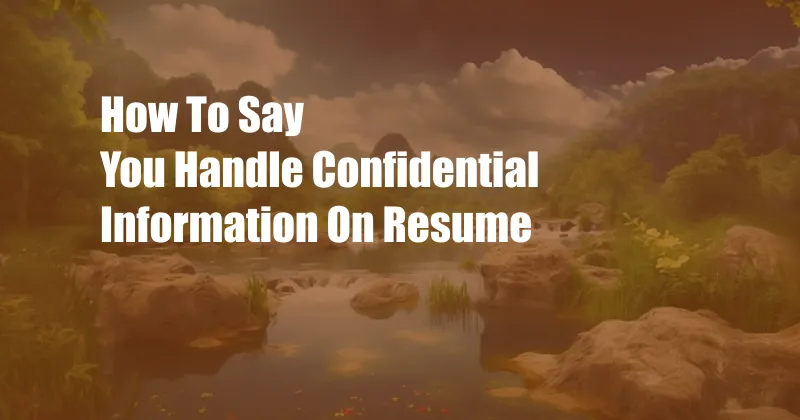
How to Say You Handle Confidential Information on Your Resume
In today’s digital age, confidentiality is more critical than ever before. Employers need to trust that their employees can keep sensitive information confidential, and job seekers need to be able to demonstrate their ability to do so on their resumes.
There are a few different ways to say you handle confidential information on your resume. One way is to use a general statement, such as: “I understand the importance of confidentiality and take steps to protect sensitive information.” Another way is to provide specific examples of how you have handled confidential information in the past. For example, you could say: “I have experience with HIPAA compliance and have successfully implemented security measures to protect patient data.”
Maintaining Confidentiality in the Workplace
Regardless of the method you choose, it is important to be clear and concise in your language. Employers should be able to understand your commitment to confidentiality without any ambiguity.
In addition to your resume, you may also be asked about your experience with handling confidential information during job interviews. Be prepared to answer questions about how you would protect sensitive information in a variety of situations.
Ethics and Legal Obligations
Confidentiality is not just a matter of following company policy. It is also an ethical and legal obligation. Employees who violate confidentiality agreements can face serious consequences, including termination of employment and criminal charges.
Here are some tips for handling confidential information:
- Only access information that you need to do your job.
- Do not share confidential information with anyone who does not need to know it.
- Store confidential information in a secure location.
- Dispose of confidential information properly.
- Report any breaches of confidentiality immediately.
Expert Advice
In addition to the tips above, here are some expert tips on handling confidential information:
- Be aware of your company’s confidentiality policies and procedures.
- Use strong passwords and encryption to protect electronic data.
- Be cautious about sharing confidential information via email or social media.
- Stay up-to-date on the latest security threats and trends.
FAQs on Handling Confidential Information
Q: What are the consequences of violating a confidentiality agreement?
A: The consequences of violating a confidentiality agreement can vary depending on the severity of the violation. However, they may include termination of employment, legal action, and damage to your reputation.
Q: How can I protect myself from being accused of violating a confidentiality agreement?
A: The best way to protect yourself from being accused of violating a confidentiality agreement is to follow the tips and advice outlined in this article. By being careful with confidential information and taking steps to protect it, you can help to avoid any potential problems.
Conclusion
By following the tips and advice in this article, you can demonstrate your commitment to confidentiality and increase your chances of landing your dream job.
Is there anything else you would like to know about handling confidential information?